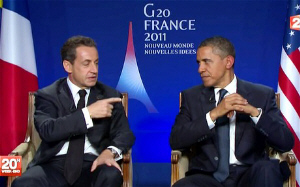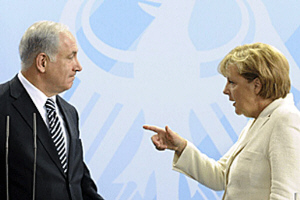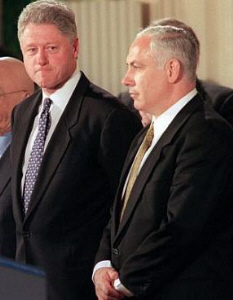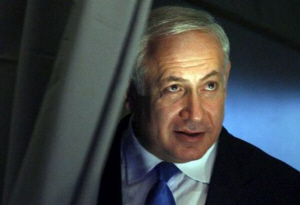Zionist Benjamin Netanyahu may be feted at home for his role in freeing captive soldier Gilad Shalit, but abroad, world leaders are barely managing to hide their disdain for the media-savvy prime minister.
 The Zionist Benjamin Netanyahu may be feted at home for his role in freeing captive soldier Gilad Shalit, but abroad, world leaders are barely managing to hide their disdain for the media-savvy prime minister.
The Zionist Benjamin Netanyahu may be feted at home for his role in freeing captive soldier Gilad Shalit, but abroad, world leaders are barely managing to hide their disdain for the media-savvy prime minister.
Just how much Netanyahu is failing to win the respect of his global peers emerged on Tuesday after a French website published remarks by President Nicolas Sarkozy, who described him as a "liar" during a private conversation with US President Barack Obama at the G20 summit in Cannes last week.
"I can't stand him anymore, he's a liar," Sarkozy said in French in remarks which were inadvertently transmitted over the translation system and heard by reporters.
"You may be sick of him, but me, I have to deal with him every day," Obama replied.
The remarks were first reported by Arret Sur Images online news site.
 It was not the first time world leaders have expressed disappointment or even anger with Netanyahu, with most of the frustration focused on the lack of progress in resolving the conflict with the Palestinians.
It was not the first time world leaders have expressed disappointment or even anger with Netanyahu, with most of the frustration focused on the lack of progress in resolving the conflict with the Palestinians.
In February, German Chancellor Angela Merkel reportedly lashed out at him after he criticized Berlin for backing a UN Security Council resolution condemning settlements.
"How dare you?" Merkel told Netanyahu in remarks reported by Zionist daily Haaretz. "You are the one who disappointed us. You haven't made a single step to advance peace."
The two had another difficult conversation last month, in which Merkel questioned his commitment to restarting talks after Zionist entity approved a swathe of new homes in annexed east Jerusalem.
EU foreign policy chief Catherine Ashton has also urged him to show "leadership," and in May he irked Obama by publicly lecturing him in the Oval Office on the historic struggles of the Jewish people -- live on television.
 Shortly afterwards, US Defense Secretary Robert Gates reportedly criticized Netanyahu, describing him as "ungrateful," and saying Washington had "received nothing" in exchange for its support of the Zionist entity's security needs, in remarks published by a respected US columnist.
Shortly afterwards, US Defense Secretary Robert Gates reportedly criticized Netanyahu, describing him as "ungrateful," and saying Washington had "received nothing" in exchange for its support of the Zionist entity's security needs, in remarks published by a respected US columnist.
Even during his previous term in office (1996-1999), Netanyahu was not fully trusted, with US president Bill Clinton saying he had reneged on pledges to withdraw from occupied Palestinian land, torpedoing peace efforts, with the White House accusing him of failing to honor commitments made "at the highest level."
Around the world, Netanyahu is viewed "with a few notable exceptions, with growing disapproval," political analyst Yossi Alpher told media sources.
"But those exceptions are important, particularly to the Israeli public," he said.
"The Obama administration is clearly unhappy with him, but he manages to get around the effect of this on Israeli public opinion by showing that he's very much accepted by Congress and by a large section of American public opinion."
Opinion polls in the occupying entity showed widespread approval for Netanyahu's role in the release last month of Shalit, the Zionist soldier who had been held captive for more than five years by Hamas -- despite it costing the release by Zionist cabinet of more than 1,000 Palestinian prisoners.
